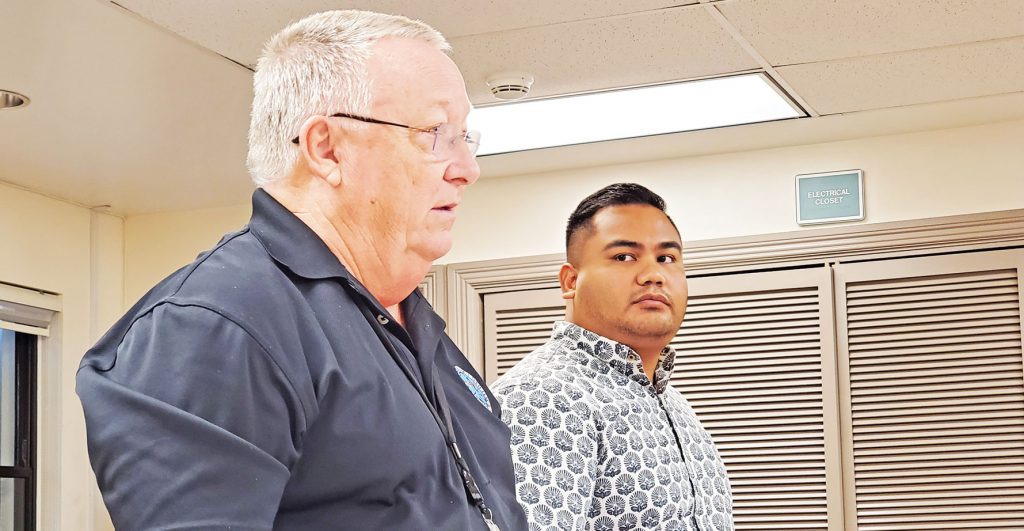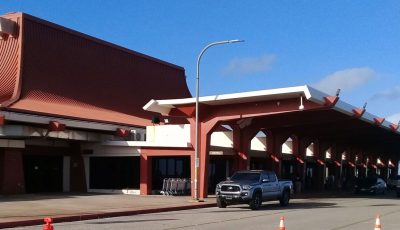CUC, CPA still in talks on lease for 1.5MW power plant

Commonwealth Utilities Corp. acting executive director William Gilmore, left, and CUC legal counsel assistant attorney general Jose Mafnas conduct a presentation last Wednesday before the Commonwealth Ports Authority board’s Airport Facilities Committee about their ongoing negotiation with CPA’s management to lease CPA’s property for CUC’s 1.5 megawatt power plant. (FERDIE DE LA TORRE)
The managements of the Commonwealth Utilities Corp. and the Commonwealth Ports Authority are still in talks over the terms of CUC’s lease for a 1.5-megawatt power plant on CPA’s property, to be used during a disaster or emergency.
The issue came up at the CPA board’s Airport Facilities Committee meeting last Wednesday, with assistant attorney general Jose Mafnas, acting as CUC counsel, saying that CUC’s board and management remain open to discuss this further with CPA.
“We think that the 1.5-megawatt engine would be extremely beneficial not just to CPA and the wells in its property, and the water being provided to CPA but also to all the residents of the south,” said Mafnas.
As to the rent, CUC is asking CPA to reduce the rent by 50% or to about $1,438 per month and, instead of a 20% increase every five years, reduce that to a 5% increase every five years, Mafnas said.
CPA director Pete P. Reyes raised the idea of not charging CUC at all for the use of the use of CPA’s property on Rota for CUC’s other planned 1.5-megawatt power plant. “Things are pretty difficult on Rota right now. The price is up, everything is up,” he said.
CPA board chair Kimberlyn King-Hinds pointed out that CPA and CUC managements are still in negotiation and that CPA management is not ready to recommend any action.
Reyes said he is not sure how far they’ve gone with the negotiations, but he remembers there were several discussions about the matter in the past. “I remember raising this issue once. Because there was a sentiment from CUC that they want to use this piece of property. And since it’s going to address rescuing CPA in the event of the disaster, this is something I felt were mutually beneficial for both CPA and CUC,” Reyes said.
CPA staff attorney Joseph Hallahan said that CUC offered in October last year to pay CPA a nominal amount of $1 to lease the property but CPA shot that down. “We told them at that meeting that the [Federal Aviation Administration] had informed us that there has to be a monetary value and that’s part for our grant assurances,” Hallahan said. This is why the CPA management went forward with the fair market value of the property because of FAA’s position.
CPA Airport Facilities Committee chair Barrie C. Toves said, “We’ll leave it up to the management to continue the negotiation and discussion with both parties.”
Mafnas clarified that the numbers and terms that he presented are in regards to the Saipan power plant, as they are still working on the Rota property.
“But the idea is, once we finalize…this master lease for Saipan, the same would apply for Rota. But we still don’t have that numbers. So this is mainly for Saipan as to the monetary figures,” Mafnas said.
Toves said CUC and CPA managements continue to work together on the final details to present a final product to the committee for consideration.
At his presentation, Mafnas said CUC needs only 200 by 200 square feet for both Saipan and Rota power plants. He said these plants are going to be used only in emergencies or disasters and would just power the wells that are on CPA property, which is why he previously gave a very nominal amount of rent. At the time, Mafnas said, CUC’s proposal was $1 for 40 years.
“And of course, that was returned back to me to charge a certain amount of rent for fair market value,” Mafnas said.
The $1 rent, he said, was based on the value being that CUC would provide free power to CPA in the event of an emergency or disaster. He said the power plant is a non-revenue generating facility.
“So I guess one thing for the record to be clear is CUC cannot be or will not be paying rent, but not charging for power. So in the event of an emergency or disaster, of course CUC will be charging CPA for the power used during such event,” Mafnas said.
Mafnas said he counteroffered that the rent be reduced by 50%, which would be about $1,438.60 per month.
“And of course there is a five-year periodic increase of 20%, if that can be adjusted to 5%,” he said.
Mafnas said CUC is always open to talk with CPA and its executives as well as the governing body.
He said the $1 rent amount was based on the CUC providing free power in the event of a disaster or emergency.
“Now that I guess the rent amount has been included, CUC will not be providing free power. Of course it will be charging based on the applicable rate,” Mafnas said.



























